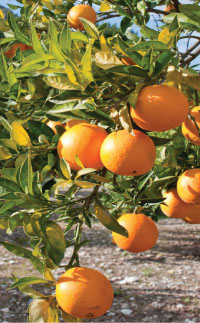Soil & Sea: reports from our producers
This article was originally published in March 2012

PRICES FOR CALIFORNIA NAVEL ORANGES were about 20 percent higher during the 2011-2012 season over the previous year due to a smaller crop and increased demand in the export market.
NORTHWEST CHERRY GROWERS produced 18.4 million 20-pound boxes in 2011, the second largest crop on record. Growers are hoping this year’s mild winter won’t hamper the 2012 crop.
WASHINGTON’S CHERRY YIELDS have been doubled by a four-year, $3.9 million U.S. Department of Agriculture project funding research at Washington State University and other universities. The project has researched new varieties and systems of growing cherries, as well as efficient sorting and packaging.
A VIRUS INFECTING CHERRY TREES poses a threat to the Northwest industry, and short of cutting down the trees and replanting, there is no cure. Growers can’t identify “little cherry disease” by looking at their trees, but eaters detect a bitter acid flavor in the fruit.
AUTOMATED APPLE HARVESTERS may help alleviate worsening picker shortages for Washington growers in just a couple of years. The harvesters may reduce the need for pickers by a third.
THE CATTLE MARKET is expected to rebound in 2012 if the return of wetter weather allows cattle ranchers to rebuild their herds rather than send their cows to slaughter. Cattle prices are projected to remain strong for many years.
SHRIMPERS IN LOUISIANA say last fall’s white shrimp season was the worst they’ve seen. Despite lower volume, prices did not rise. That’s because Gulf shrimp account for less than 15 percent of the total U.S. shrimp supply. The lower volume of shrimp is blamed on the BP oil spill and flooding last spring, which disrupted breeding grounds.
U.S. PRODUCTION OF MANILA CLAMS, mostly farm-raised in the tidelands of Washington state, has been relatively stable, although production slumped last year. Growers in Puget Sound cite ongoing issues with leaky septic tanks as their main impediment to increased production.
